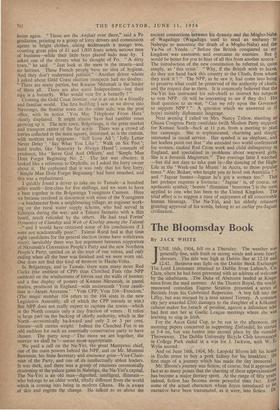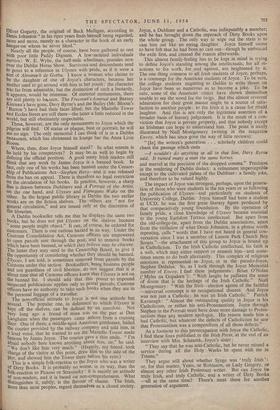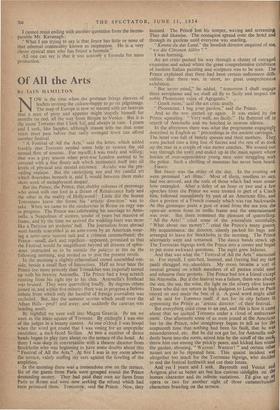The Bloomsday Book
By JACK WHITE JUNE 16th, 1904, fell on a Thursday. The weather wag generally fine, with fresh or strong winds and some hem showers. The tide was high at Dublin Bar at 12.18 an 12.42. Business was light on the Dublin Stock Exchange. The Lord Lieutenant returned to Dublin from Lahinch, Co. Clare, where he had been presented with an address of welcon 0 by the inhabitants. The Duke of Abercorn landed at Kin, town from the mail steamer. At the Theatre Royal, the world. renowned comedian Eugene Stratton presented a series Of Recitals from his Celebrated Repertoire. A boy fell into the Liffey, but was rescued by a man named Tierney. A commca city jury awarded £200 damages to the daughter of a KilkencY cabinet maker for breach of promise, against a defendant who had first met her at Gaelic League meetings where she was learning to sing in Irish. For the Ascot Gold Cup, to be run in the afternoon, 00 morning papers concurred in supporting Zinfandel; he started at 5-4 on, but was beaten into second place by the outsider Throwaway. The Dublin University Bicycle Club tournamet t in College Park ended• in a win for J. Jackson. with W. 13. Wylie second.
And on June 16th, 1904, Mr. Leopold Bloom left his houf in Ecclet street to buy a pork kidney for his breakfast : th first stage of a journey which has made the day immortal. Mr. Bloom's journey was fiction, of course; but it approaclits fact at so many points that the charting of these approximatiors has become a major literary sport. At the range of fifty year' Oliver Gogarty, the original of Buck Mulligan, according to Denis Johnston "in his riper years finds himself being regarded, More and more, merely as a character in the book of an early hanger-on whom he never liked."
Nearly all the people, of course, have been gathered to rest With poor little Paddy Dignam. A few isolated individuals Survive: W. E. Wylie, the half-mile wheelman, presides now over the Dublin Horse Show. Survivors and descendants tend to point to a reference in Ulysses with pride, as if it were a sort of Almanach de Gotha. I know a woman who claims to be the daughter of one of Joyce's characters, because her mother used to go around with him in her youth : the character Was far from admirable, but the distinction of such a bastardy, it appears, would be immense. Of material monuments, there are still plenty to babseen. The Freeman's Journal and Barney Kiernan's have gone, Davy Byrne's and the Bailey (Mr. Bloom's Burton') have had their faces lifted; but the Martell° Tower and Eccles Street are still there—the latter a little reduced in the World, but still obstinately respectable. These, however, are the only monuments to Joyce which the Pilgrim will find. Of statue or plaque, bust or portrait, he will see no sign. The only memorial I can think of is in a Dublin restaurant, which has christened its lounge bar the Anna Livia Room.
Where, then, does Joyce himself stand? In what esteem is he held by his compatriots? It may be as well to begin by defining the official position. A good many Irish readers still think that any work by James Joyce is a banned book. In fact, only one of his works has been banned under the Censor- ship of Publications Act—Stephen Hero—and it was released from the ban on appeal. There is therefore no legal restriction O n the circulation of his books. In practice, however, a sharp line is drawn between Dubliners and A Portrait of the Artist, on the one hand, and Ulysses and Finnegans Wake on the other. In the largest public library in Dublin the two earlier works are on the fiction shelves. The others are "not for general circulation," and are issued only at the discretion of the librarian.
A Dublin bookseller tells me that he displays the same two !Dooks, but he does not put Ulysses on the shelves because ` some people might object." It can, of course, be ordered for customers. There is one curious hazard in its way. Under the Customs Consolidation Act, Customs officers are empowered to open parcels sent through the post, and to remove books Which have been banned, or which they believe may be obscene. The latter they may send to the Censorship Board, to give it the opportunity of considering whether they should be banned. Ulysses, I am told, is sometimes removed from parcels by the Customs under this section. Booksellers, being business people and not guardians of civil liberties, do not suggest that it is about time that all Customs officers knew that Ulysses is not on the banned list. I should add that this power to impound • suspected publications applies only to postal parcels; Customs • officers have no authority to take such books when they are in the personal luggage of a traveller. The non-official attitude to Joyce is not one attitude but several. The popular one, in deference to which Ulysses is kept off the shelves, can be defined by an anecdote. Not ,very long ago a friend of mine was on the pier at Dun Laoghaire when the passengers came ashore from a cruising liner. One of them, a middle-aged American gentleman, hailed the courier provided by the railway company and told him, in a loud voice, that he wanted to see the Martello Tower made famous by James Joyce. The courier gave a thin smile. "I'm afraid nobody here knows anything about hhn, sir," he said. "We don't like him very much." (Happily, my friend took Charge of the visitor at this point, drew him to the side of the Pier, and showed him the Tower there before his eyes.) This is a simple folk-reaction to the Joyce who was a writer Of Dirty Books. It is probably no worse, in its way, than the folk-reaction to Picasso or Stravinsky : it is mainly an attitude of non-readers, and it is based on non-comprehension. What distinguishes it, subtly, is the flavour of shame. The Irish, More than most peoples, regard themselves as a closed society. Joyce, a Dubliner and a Catholic, was indisputably a member; and he has brought down the reproach of Dirty Books upon the whole group. The only way to wipe out the stain is to cast him out like an erring 'daughter. Joyce himself seems to have felt that he had been so cast out—though he embraced the exile first, and created the reason afterwards.
This almost family-feeling has to be kept in mind in trying to define Joyce's standing among the intellectuals; for all re- actions to his work, for and against, are heightened by it. The one thing common to all Irish students of Joyce, perhaps, is a contempt for the American students of Joyce. To be sure, the college students migrating to Dublin to write theses on Joyce have been so numerous as to become a joke. To be sure, some of the American critics have shown themselves unable to see the wood for the twigs. But this almost reverent admiration for their great master might be a source of satis- faction to another people : to the Irish it is a cause for ribald laughter. And this is not only the legitimate assertion of a broader basis of literary judgement. It is the result of a con- viction that Joyce is private property, and that nobody except an Irishman can hope to understand him. The point is nicely illustrated by Niall Montgomery (writing in the magazine Envoy, which has since gone the way of little reviews): "[In] the writers's generation . . . scholarly children could chant the passage which ends —I wouldn't do anything at all in that line, Davy Byrne said. It ruined many a man the same horses.
and marvel at the precision of the dropped comma." Precision in the rendering of Dublin dialect : a refinement imperceptible except to the cultivated palate of the Dubliner: a family joke, and therefore to be valued highly.
The impact of Joyce was strongest, perhaps, upon the genera- tion of those, who were students in the ten years or so following the publication of Ulysses—and particularly on students of University College, Dublin. Joyce himself had been a student at UCD; he was the first great literary figure produced by that comparatively young foundation. By the operation of family pride, a close knowledge of Ulysses became essential to the young Earlsfort Terrace intellectual. But apart from the old-college-tie, apart from the Dublin associations, apart from the titillation of what Denis Johnston, in a phrase worth repeating, calls "words that I have not heard in general con- versation since I was a member of Leeson Park Church Boy Scouts "—the attachment of this group to Joyce is bound up in Catholicism. To the Irish Catholic intellectual, his faith is a web, which may either support or enmesh him—and some- times seems to do both alternately. This complex of religious emotions is represented in Joyce, or in the pseudo-Joyce, Stephen Dedalus. So, as I look through the Joyce Memorial number of Envoy, I find these judgements : Brian O'Nolan (' Myles na Gopaleen '): "With laughs he palliates the sense of doom that is the heritage of the Irish Catholic." Niall Montgomery : "With the Irish—election agents of the faithful —universal contempt is an occupational disease. And Joyce was not just a Catholic: he was an Irish Catholic." Patrick Kavanagh : "Almost the outstanding quality in Joyce is his Catholicism, or rather his anti-Protestantism. Joyce through Stephen in the Portrait must have done more damage to Protes- tantism than any modern apologist. His reason made him a bad Catholic, but whatever the defects of Catholicism he saw that Protestantism was a compendium of all those defects."
As a footnote to this preoccupation with Joyce the Catholic, I find these lines published in the Irish Press, at the end of an interview with Mrs. Schaurek, Joyce's sister: "They say that he was anti-Catholic, but he never missed a service during all the Holy Weeks he spent with me in Trieste."
They argue still about whether Synge was 'truly Irish ': or, for that matter, Yeats, or Robinson, or Lady Gregory, or almost any other Irish Protestant writer. But can Joyce be truly Irish, and truly Catholic, and a writer of Dirty Books, —all at the same time? There's meat there for another generation of argument. I cannot resist ending with another quotation from the incom- parable Mr. Kavanagh: "What I am trying to say is that Joyce has little or none of that ethereal commodity known as inspiration. He is a very clever cynical man who has found a formula." All one can say is that it was scarcely a formula for mass production.




































 Previous page
Previous page